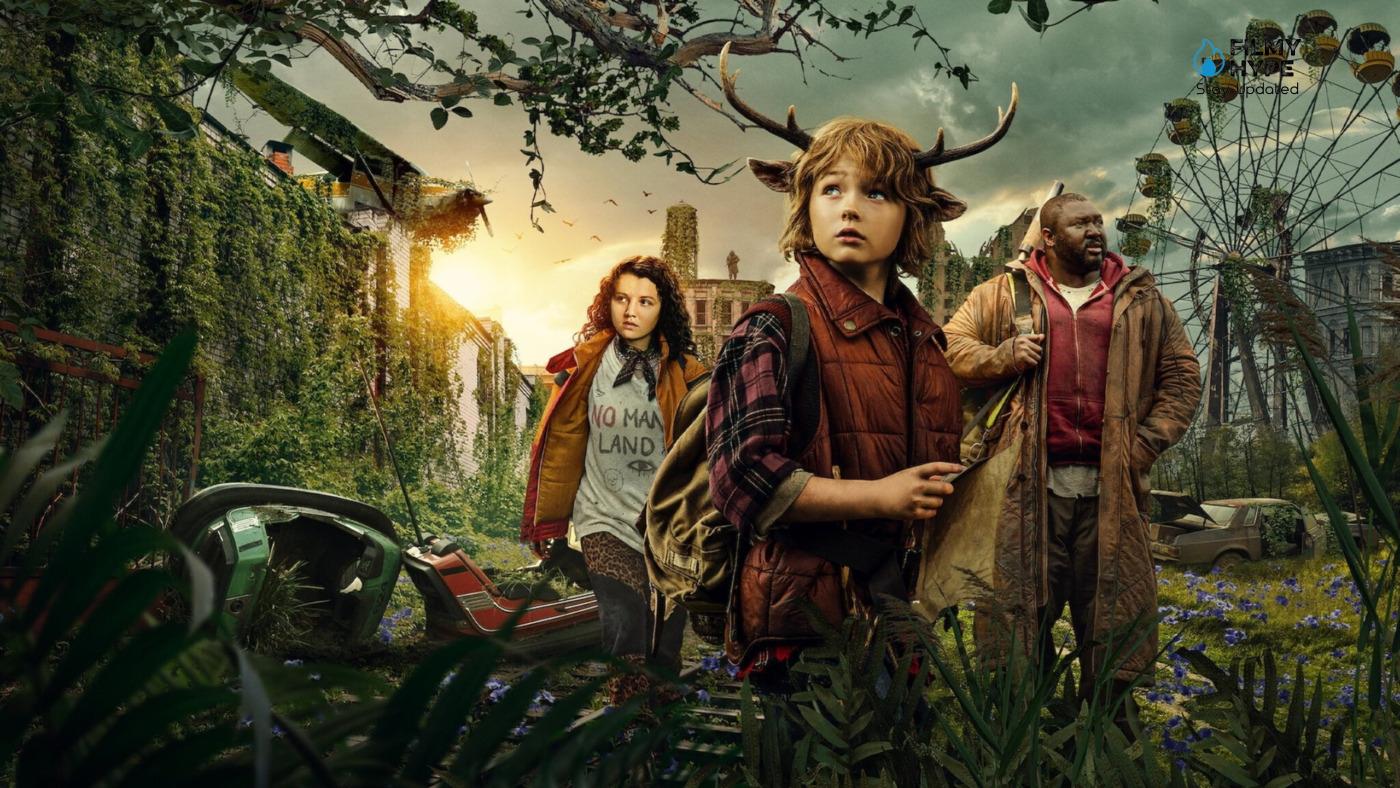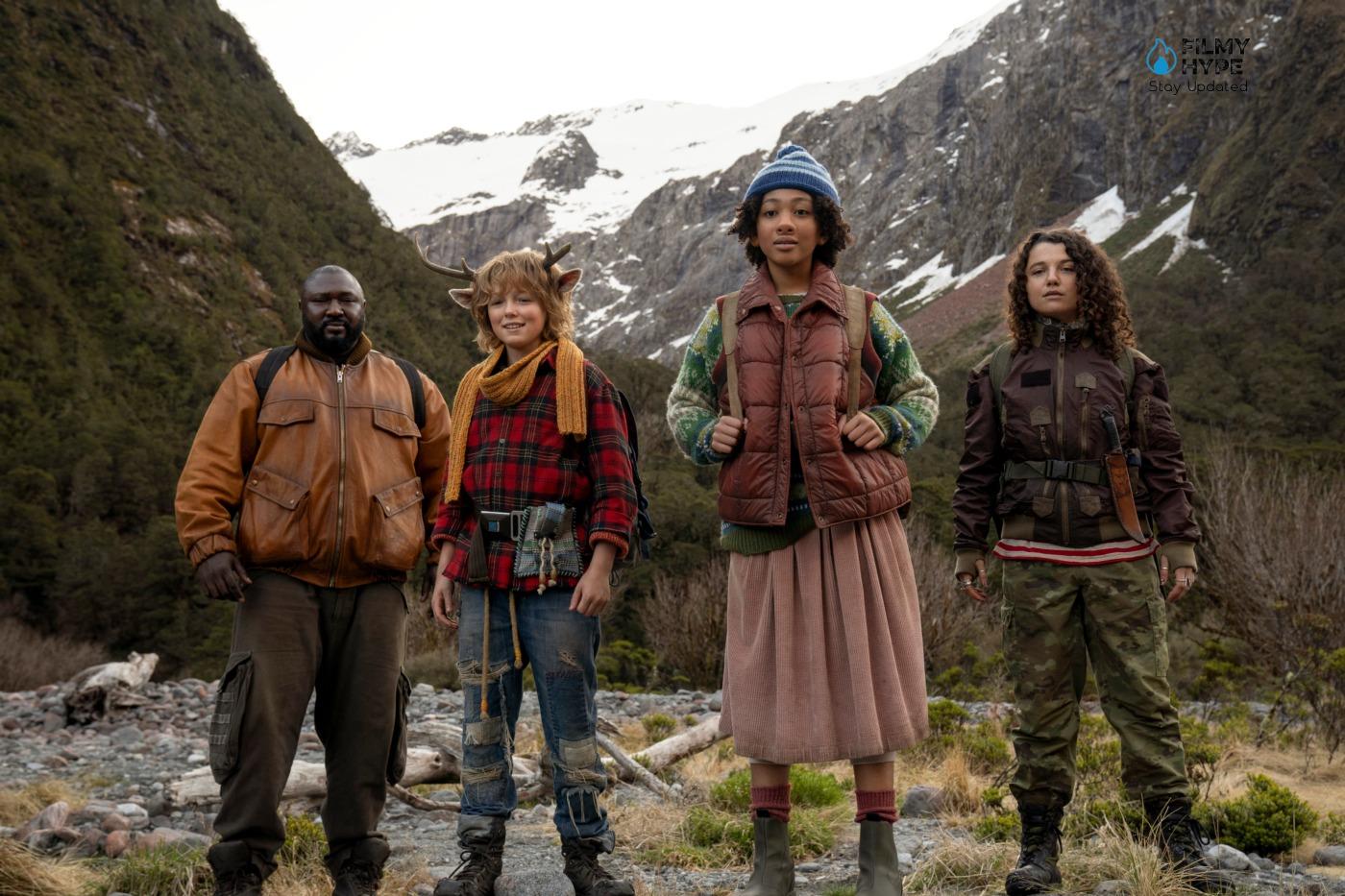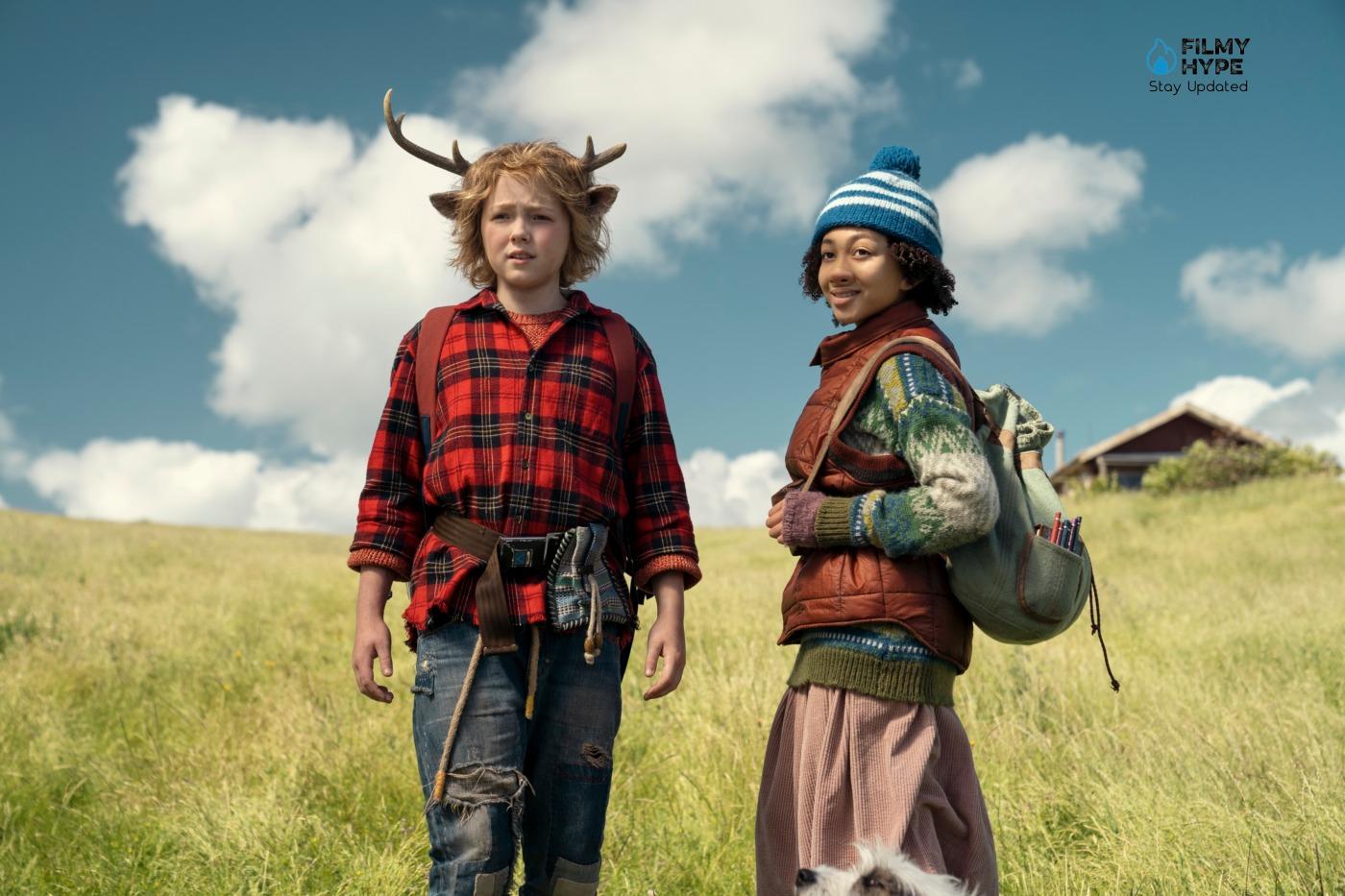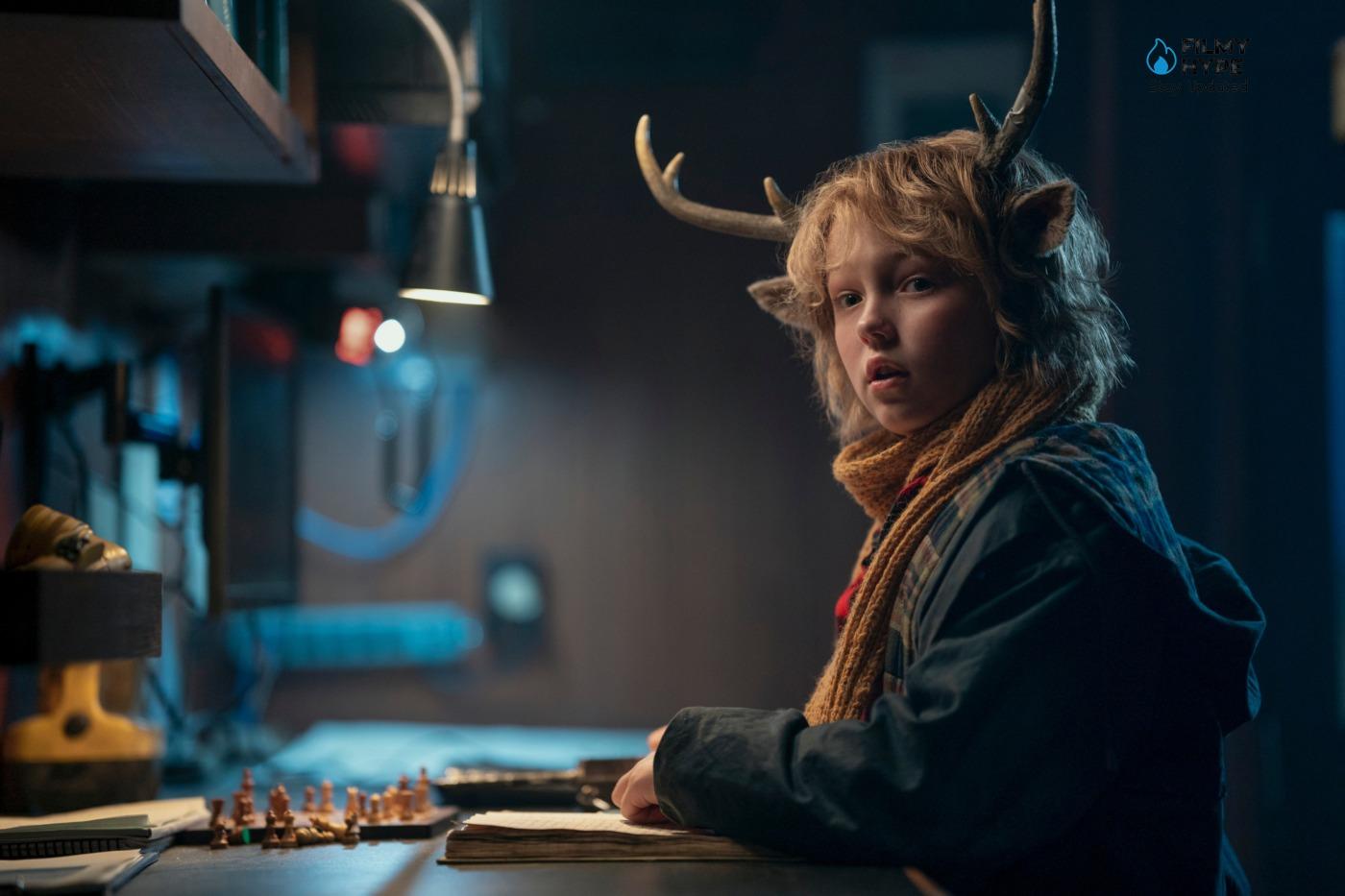Sweet Tooth Season 3 Review: Manages to Bring to the Screen a Story With Fairy-Tale Tones
Cast: Christian Convery, Nonso Anozie, Stefania LaVie Owen, Dania Ramírez
Created By: Jim Mickle
Streaming Platform: Netflix
Filmyhype.com Ratings: 4/5 (four stars)
On June 6th, the 8 episodes of Sweet Tooth Season 3 were released on Netflix, the fantasy TV series based on the comics by Jeff Lemire as its protagonist a boy-deer who fights for the survival of his species but also of the human one “traditional”. If, like us, you have been following this TV series since its beginnings, three years ago, it is likely that you are impatiently waiting to see the end of this story, so dramatic and yet so sweet: before talking about the ending, however, let’s see the plot together (without spoiler) of Sweet Tooth Season 3 and let’s analyze its strengths and weaknesses according to our opinion. Just over a year after the release of the second season, Sweet Tooth lands on Netflix with its third and final chapter, which promises to keep its – perhaps not excessively large but certainly very fond – audience glued to the screen, leading them into an ‘incredible journey to the end of the world, always in the company of little Gus and his inseparable friends.

In these last episodes of the show, our protagonists will embark on a dangerous adventure towards Alaska to discover the truth about the origin of the terrible virus that has almost exterminated the human race, leading to the birth of hybrid children, half human, and half animals. As we will see in our review of Sweet Tooth Season 3, the series based on the comic by Jeff Lemire and created by Jim Mickle maintains intact all its charm and the delicacy with which it manages to bring to the screen a story with fairy-tale tones, but also full of suspense and adventure, always attentive to environmentalist themes and moral dilemmas regarding science and its limits. Sweet Tooth thus confirms itself as a little jewel in the platform’s catalog, which certainly deserves greater resonance.
Sweet Tooth Season 3 Review: The Story Plot
Sweet Tooth Season 3 picks up where we left off with our unlikely heroes: Gus (Christian Convery) aka Golosone, the deer-boy hunted by everyone because he is the First Hybrid, Tommy Jepperd aka Big Man (Nonso Anozie), the former football player now the protector of the protagonist, Becky (Stefania LaVie Owen), the other human of the gang, founder, and leader of the Animal Army that eliminated the Last Men, together with her adoptive sister Wendy (Naledi Murray), the pig-girl. They’re all headed to Alaska, where the secret about the hybrids and the Affliction is said to lie, to find Gus’ mother. The latter shares the dreams that make him see a mysterious cave with Dr. Singh (Adeel Akhtar) who after losing his wife would like to make amends for all the horror committed in the name of science, and his mother Birdie (Amy Seimetz), who took refuge in the Arctic precisely to seek the cure for the Affliction and the truth about hybrids, together with Siana (Cara Gee), head of a secret outpost in the ice, and her fox-daughter Nuka (Ayazhan Dalabayeva).

One of the most powerful and fascinating themes of Sweet Tooth has always been, and remains in this third season, the environmental one. Set in a post-apocalyptic world devastated by a pandemic, the series introduces us to a universe in which nature has regained control over planet Earth in rather surprising ways: the pandemic – here called “affliction” – has decimated the human race and led to the birth of hybrid children, living symbols of the devastating effects of human actions on the ecosystem and natural balance. In the third season, this theme becomes even more central and urgent: environmental devastation is not just an apocalyptic setting, but a narrative element that enriches and guides the story, while the protagonists, each in their own way, will have to deal with the consequences of past actions and find new ways to restore balance with Mother Nature.
This translates into a narrative that not only entertains but also invites us to reflect on our responsibilities towards the planet, asking us fundamental questions: how far can humanity go in its dominion over nature? What are the ethical limits of science when it comes to genetic experimentation and manipulation? And, above all, how can we repair the damage already done? Through the journey of Gus and his companions, Sweet Tooth explores these questions with a sensitivity and depth rarely seen in other television series. We are therefore preparing for the classic final clash between good and bad, with the future of men and hybrids at stake, and we will also discover why it all started up there a long time before.
Sweet Tooth Season 3 Review and Analysis
The third season of Sweet Tooth stands out for its extraordinary visual richness, which goes far beyond the simple concept of background for the narrative: the Netflix series transports viewers into a timeless post-apocalyptic world, where destruction and beauty coexist giving a fascinating show. The locations are carefully chosen and with attention to detail, the lush forests are depicted with a magnificent intensity, conveying a sense of wonder and mystery as the characters move through them. On the other hand, the scattered urban ruins are painted with a desolate majesty, evoking a feeling of nostalgia for a now-lost world. It is this contrast between natural beauty and human decadence that captures the essence of the story, suggesting a profound reflection on the relationship between humanity and its surroundings.

Sweet Tooth’s narrative stands out for its extraordinary delicacy and humanity, a combination that has managed to capture the hearts of viewers since the first episode of the first season. Even in the darkest and most desperate moments, the series maintains a tone of hope that resonates deeply: a quality that emerges particularly in this third season, capable of skillfully balancing moments of tension and danger with moments of intimacy and emotional connection, in which universal themes such as love, loss, and the search for a sense of belonging are addressed. The direction and screenplay work in perfect harmony to create a story as touching as it is compelling, offering viewers a deep and engaging experience and episodes constructed specifically to enhance the emotional nuances of the characters. Christian Convery, in the role of the little protagonist Gus, continues to give viewers an extraordinary performance. His ability to express innocence, curiosity, and determination together makes his character irresistible. Despite his young age, Convery demonstrates impressive acting maturity, making the challenges and adventures that Gus must face believable.
No less notable are the performances of Nonso Anozie as Tommy Jepperd, a former football player who becomes Gus’ protector, and Adeel Akhtar as the tormented Dr. Singh. Both actors bring depth and complexity to their characters that enrich the narrative and offer an interesting counterpoint to Gus’ adventures. Anozie, in particular, manages to convey his transformation from a cynical man to a protective father figure with great skill. The Zhang family also deserves a special mention – barely glimpsed in the last season and here with a central role as villains – who embody the refusal of human beings to accept everything differently. This final season of Sweet Tooth is far from perfect. Beyond the expedients used to disguise the fact that Christian Convery is no longer ten years old (but still better than the alienating effect of Stranger Things), we were surprised to notice that some narrative paths (read “characters”) that last season had left open were not picked up, and others were not developed when perhaps they deserved more.

But as imperfect as it is, Sweet Tooth Season 3 is the final season we needed. It brings the story to its natural conclusion, and it does so with that mix of sweetness and drama, of love and hate that distinguishes Sweet Tooth from the first episode. We have now become so fond of the main characters, and also the secondary ones, that seeing them reach the end of their journey is both liberating and sad at the same time. Jim Mickle, who adapted Lemire’s comics, managed to accompany us on this long journey without ever betraying the values of his characters (despite the numerous and sensitive differences with the much darker comic), leaving us with memories forever of a moving and instructive series, imperfect in some passages but memorable for its authenticity. Despite deer antlers, pig faces, and the whole hybrid universe that has now become familiar to us.
One of the strengths of this latest turning point for the Netflix series is certainly the cast: on the one hand the now consolidated one in which the young people played, led by an irresistible Christian Convery, who manages to restore all the courage, the innocence (which he is about to lose permanently) and Gus’ sweetness. On the other, the new entries with some welcome returns to close the circle, in particular the Zhang family, only glimpsed in the second season and this time central as villains. An enemy who represents human beings who are unable to accept diversity and wants to keep them divided and distinct from animals, forcing a return to original procreation (does this remind you of anything?). A mirror of the times in which we live, in which we are unable to accept anything slightly different from what is considered canonical by society (and a monologue by Gus is emblematic in this sense). In short, Rosalind Chao is a terrible and fierce Helen Zhang, while the rest of the family is “forced” to follow her, starting with her daughter Rosie (Kelly Marie Tran) showing an unprecedentedly wicked treatment of hybrids, which hurts the Heart.

The themes carried forward by the show are universal and even more so at the end: we are talking about coexistence between animals and humans, and the revelation of the truth about the Affliction will bring interesting implications for all the people involved, revealing their true selves. Where does instinct end and reason begin? Are we sure which species needs to be safeguarded and what attitude we should have towards what we don’t know? Almost a counterpart to the Planet Earth in which we live, which due to climate change we no longer know how much longer it will be able to host us sustainably. Despite some flaws in the last episodes in terms of rhythm and plot twist, Sweet Tooth gives us a poetic, all-encompassing, bittersweet, everlasting ending. To be seen and revisited, like an excellent bedtime story.
Sweet Tooth Season 3 Review: The Last Words
Sweet Tooth Season 3 keeps all its charm intact and the delicacy with which it manages to bring to the screen a story with fairy-tale tones, but also full of suspense and adventure, always attentive to environmentalist themes and moral dilemmas regarding science and its limits. Sweet Tooth thus confirms itself as a little jewel in the platform’s catalog, which certainly deserves greater resonance. Sweet Tooth Season 3 confirms the intrinsic value of the Netflix series by combining fairy tales and horror and showing a dystopian world with a new hybrid species that must make peace with its past and find a solution of coexistence with humanity. These last eight episodes are compelling and engaging, thanks to the production apparatus and the performances of the cast, especially the younger ones and including the new (very bad) arrivals, to arrive at an epilogue that resolves all the questions left open and reflects incredibly on our current affairs. That is, an ecosystem affected by climate change on a planet that we do not yet know will be habitable, and above all by whom?







